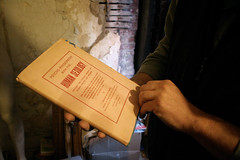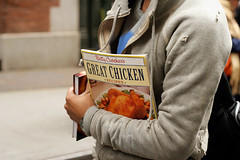The Kindle: Not a Book, but a Massive Portable Library,
published at 4:01am on 01/11/12
The most important thing I’ve learned about my Kindle is that it’s not a book; it’s a vast, portable library.
As a lover of physical media (though my dormant Pentax Spotmatic might take issue with that characterization), I was a little upset with myself when I got my Kindle. After all, I’ve spent a lot of time thinking about what it means that we live in an increasingly digital and intangible world, from creation to consumption, and what this means for future generations. I think a lot about the serendipity that comes from stumbling across physical items that you rediscover in your closet, and I think about the question of the durability of physical items versus their digital counterparts. So the Kindle, though it “reads like real paper,” is certainly no substitute for a physical, bound volume – not for the reading experience, not for the durability, and not for the lending proces (Kindle lending is still roughly closer to pulling teeth than it is to actual lending).
And yet, as I’ve started to use the device (specifically a Kindle Touch 3G), I’ve come to love it. I’ve specifically come to love it for what it is, rather than what it is not. For starters, it is not a book. Many of the things that make physical books great are notably absent on the Kindle:
- You can not easily loan a book to a friend
- You can not leave behind your library to your children
- You can not flip back and forth between pages
- You can not spill water on it and be fairly certain that it will recover
- You can not be guaranteed that Amazon will not rip your book back out of your Kindle if they want to
- And so on…
But to focus on these issues is to ignore the real value of the Kindle as a reading device, and specifically that it is, in fact, a reading device. It is a device that has been optimized to make it completely seamless for you to consume book-sized content wherever you are in the world (especially the 3G version). The fact that you have to rent a book in order to read it puts Amazon much more in the position of being a private, member-supported lending library than it does as a bookseller, for what they are selling is not product, but access. Note, specifically, that I acknowledge the “purchase” of Kindle content as a rental. There is no guarantee that the DRM could not be revoked, that Amazon may decide to redistribute an edited copy of your book, or that they might decide to rip the book off your device completely. But things become much more palatable when you consider the purchase as a temporal convenience.
After all, if I go to my local library to read a book, I do not get to keep that book forever. I get it for a couple of weeks, and then I have to return it. Now it just so happens that society has determined that libraries are important institutions, and provide some small amount of funding to keep those that are still running stocked with books that I can borrow whenever I want, free of charge. But books take up room, and libraries as book storage facilities are not very efficient, especially when it comes to those books for which the physical structure is not nearly as meaningful as the contents contained within. While nobody would argue that the Gutenberg Bible is an insignificant artifact in its own right, I do have a bible that looks like it came out of a hotel room nightstand, and I’m much more interested in the verse contained within than the actual book itself. In this case, I am perfectly happy to have a copy of the bible linked to my Kindle to have at the ready the next time I decide to embark on the adventure of actually trying to read the Old Testament (the last time I tried to do so was in college and I crapped out somewhere in the middle of Numbers).
In fact, it’s interesting that just this week, Barnes & Noble dropped the price of their Nook Simple Touch reader to zero, as long as you purchase a year-long subscription to the New York Times as well. There have been predictions that Amazon would do this, possibly offering Kindles for free with the purchase of their Amazon Prime program, but do I think that it’s notable that Barnes & Noble started with newspaper content as their gateway to the free reader – that is, content which is designed to be temporal from the start. By joining these two things together, they are actively positioning their reader as a content device, not as a book substitute.
It is true that there are plenty of downsides the Kindle books, mostly having to do with access and portability, but we must remember that digital books are not taking away our ability to lend our books to our friends or pass along our libraries to our children – it’s that they never granted us those abilities in the first place.
So I love my Kindle, but I will continue to purchase books for my physical library. I will just collect those volumes that I want to keep as artifacts as well as knowledge, and these will stick with me long, long after the batteries have died.
Filed under: Technology





At 1:08 am on 01.17.12, Michael E. Gruen said,
“But things become much more palatable when you consider the purchase as a temporal convenience.”
You’re buying knowledge neatly packaged. While some of that knowledge is worth printing, most paperbacks aren’t relevant by the time the pages turn brown.
In fact, some authors with out-of-print books have complained to Google’s book scanning project that they don’t want their works scanned: what they wrote isn’t relevant (or, in some cases, accurate) anymore.
Well said, jcn.
Leave a Reply: